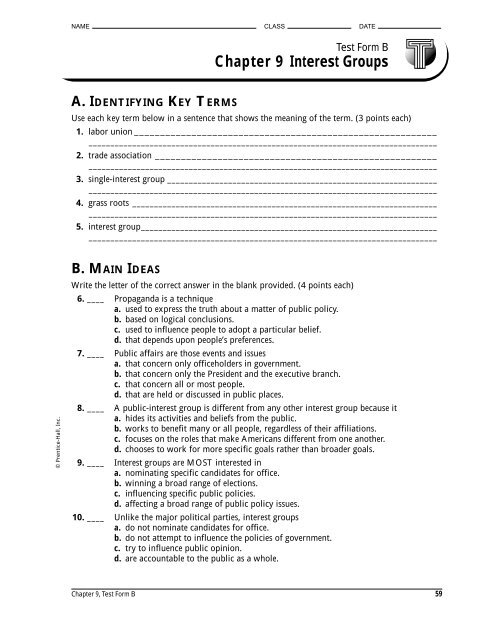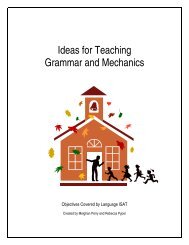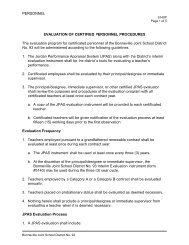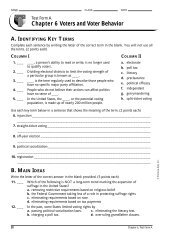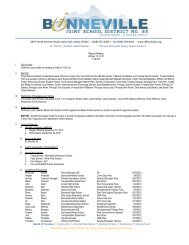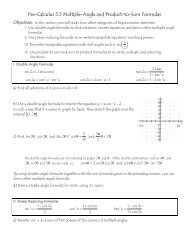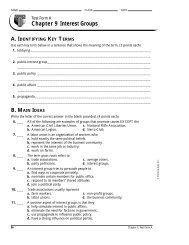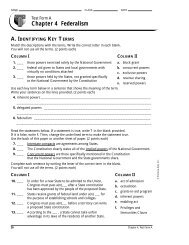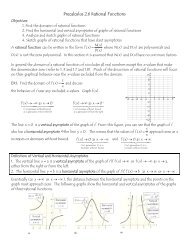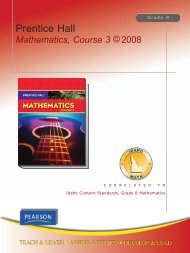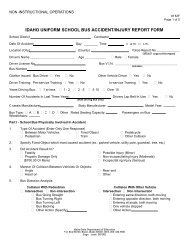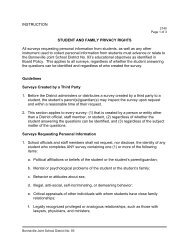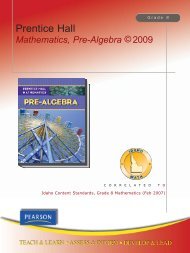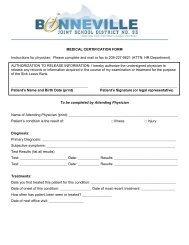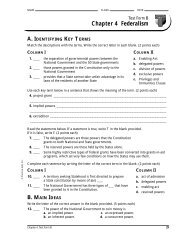Chapter 9: Test Form B
Chapter 9: Test Form B
Chapter 9: Test Form B
You also want an ePaper? Increase the reach of your titles
YUMPU automatically turns print PDFs into web optimized ePapers that Google loves.
NAME CLASS DATE<strong>Test</strong> <strong>Form</strong> B<strong>Chapter</strong> 9 Interest GroupsA. IDENTIFYING KEY TERMSUse each key term below in a sentence that shows the meaning of the term. (3 points each)1. labor union __________________________________________________________________________________________________________________________________________2. trade association ______________________________________________________________________________________________________________________________________3. single-interest group ______________________________________________________________________________________________________________________________________________4. grass roots ______________________________________________________________________________________________________________________________________________________5. interest group____________________________________________________________________________________________________________________________________________________© Prentice-Hall, Inc.B. MAIN IDEASWrite the letter of the correct answer in the blank provided. (4 points each)6. ____ Propaganda is a techniquea. used to express the truth about a matter of public policy.b. based on logical conclusions.c. used to influence people to adopt a particular belief.d. that depends upon people’s preferences.7. ____ Public affairs are those events and issuesa. that concern only officeholders in government.b. that concern only the President and the executive branch.c. that concern all or most people.d. that are held or discussed in public places.8. ____ A public-interest group is different from any other interest group because ita. hides its activities and beliefs from the public.b. works to benefit many or all people, regardless of their affiliations.c. focuses on the roles that make Americans different from one another.d. chooses to work for more specific goals rather than broader goals.9. ____ Interest groups are MOST interested ina. nominating specific candidates for office.b. winning a broad range of elections.c. influencing specific public policies.d. affecting a broad range of public policy issues.10. ____ Unlike the major political parties, interest groupsa. do not nominate candidates for office.b. do not attempt to influence the policies of government.c. try to influence public opinion.d. are accountable to the public as a whole.<strong>Chapter</strong> 9, <strong>Test</strong> <strong>Form</strong> B 59
NAME CLASS DATE<strong>Test</strong> <strong>Form</strong> B<strong>Chapter</strong> 9 Interest Groups11. ____ Which one of the following is a criticism of interest groups?a. It is hard to tell how many people they represent.b. They may have an influence far greater than their size.c. They keep a close watch on public officials.d. They do not necessarily represent the people for whom they claim to speak.12. ____ Common Cause and the League of Women Voters are examples ofa. religious organizations. c. groups that promote causes.b. public-interest groups. d. trade associations.13. ____ All of the following organizations serve the interests of organized labor EXCEPT thea. AFL-CIO. c. United Transportation Union.b. National Grange. d. United Mine Workers.14. ____ PACs that concentrate their efforts on one particular issue are also calleda. single-interest groups.b. trade associations.c. labor unions.d. public-interest groups.15. ____ Organized interest groups apply pressure to government through all of the followingmeans EXCEPTa. the use of propaganda.b. forming minor political parties.c. lobbying.d. contributing to political campaigns through their PACs.16. ____ Lobbying is the process by which group pressures are applied toa. legislative bodies.b. executive agencies.c. judicial courts.d. all aspects of the public policy-making process.17. ____ All of the following are goals of interest groups EXCEPTa. supplying the public with information they believe the people should have.b. building a positive image for their group.c. promoting a particular public policy.d. being chiefly interested in winning elections and controlling government.18. ____ Pressure groups operatea. only at the national level of government.b. at the State and local levels.c. only within the legislative branch.d. at all levels of government.19. ____ Propaganda techniques aim to bea. persuasive.b. objective.c. unethical.d. immoral.© Prentice-Hall, Inc.60 <strong>Chapter</strong> 9, <strong>Test</strong> <strong>Form</strong> B
NAME CLASS DATE<strong>Test</strong> <strong>Form</strong> B<strong>Chapter</strong> 9 Interest GroupsC. INTERPRETING POLITICAL CARTOONSUse the cartoon to answer the following questions. Write the correct answer in the blank provided.(3 points each)20. ____ The speaker is probably a(n)a. officeholder.b. lobbyist.c. ordinary citizen.d. business executive.21. ____ Why would the speaker use the words“poured in” to describe a telegram?a. to demonstrate that he disagrees withthe telegramb. to dismiss the telegramc. to indicate that he has received manytelegrams on the issued. to suggest that the telegram writer is“all wet”22. ____ The main topic of the cartoon isa. how Congress works.b. lobbying.c. abuses by the media.d. communication.©The New Yorker Collection 1987 Henry Martin from cartoonbank.com. All Rights Reserved.© Prentice-Hall, Inc.D. CRITICAL THINKINGAnswer the following questions on the back of this paper or on a separate sheet of paper.(5 points each)23. Distinguishing False from Accurate Images Most people have a negative image ofpropaganda. The text states, “As a technique, however, propaganda is neither moral norimmoral; it is amoral.” Explain which image of propaganda is accurate.24. Checking Consistency You have read that organized efforts by groups are vital to thedemocratic process. You have also read that special-interest groups are concerned with theirown interests, and may use unfair methods to promote and persuade. Explain whether thesestatements are consistent or inconsistent.25. Predicting Consequences What would happen if a lobbyist for a particular interest grouppresented the government with information that was untrue?26. Making Comparisons Compare James Madison’s views of factions with the observations ofAlexis de Tocqueville concerning associations. Which man was more concerned about thedetrimental effects of interest groups?<strong>Chapter</strong> 9, <strong>Test</strong> <strong>Form</strong> B 61


